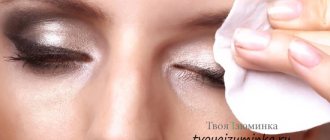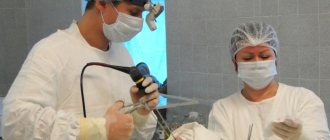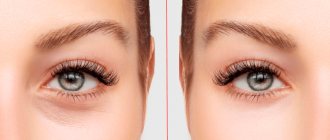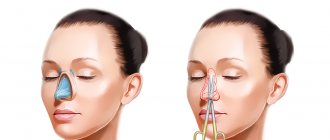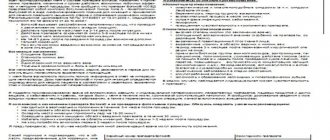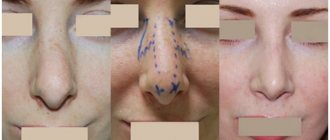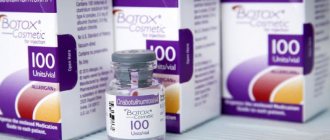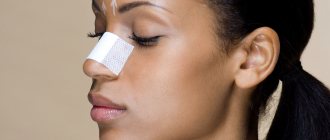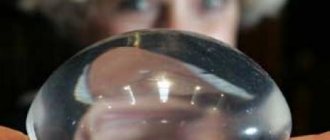Tests for rhinoplasty
When and what tests to take for rhinoplasty, what is the list of required types of examination? Most pre-rhinoplasty examinations should be performed no earlier than 14 days before surgery. A standard set of tests and instrumental examinations is listed below.
No earlier than 2 weeks before rhinoplasty, various blood tests are taken:
What other tests need to be taken before rhinoplasty? In addition to various blood tests, a general urine test is also required, which must be taken no earlier than two weeks before the upcoming operation. You should undergo an ECG no earlier than a month before the upcoming operation. If abnormalities are detected, consultation with a cardiologist is recommended.
Chest X-ray or fluorography is valid for one year. It is also necessary to provide a CT scan of the paranasal sinuses, performed in 2 projections. If any deviations are present, it is recommended to consult an ENT specialist. This type of instrumental examination should be completed no earlier than one month before the upcoming operation.
Before rhinoplasty, it is necessary to do an ultrasound of the legs; the results of this examination are valid for one month. If deviations are present, a consultation with a phlebologist is required. It is better to consult a therapist last, when there is already a full set of tests, on the basis of which the doctor is able to give an opinion about the general condition of the patient and the admissibility of surgery. You can also check with your plastic surgeon preparing you for the operation what tests are needed for rhinoplasty, because the set of mandatory examinations may be changed in cases where the operation is performed in a specific way.
It should be remembered that even after successfully passing all the tests, you may encounter contraindications for rhinoplasty. Also, rhinoplasty is characterized by contraindications after surgery, which must be taken into account to achieve the best effect from the intervention.
The main thing in the work of a plastic surgeon is the safety of his patient. Any operation is associated with risks, even those aimed at purely aesthetic changes in the body. To eliminate the risks associated with the operation, the patient is required to undergo a detailed examination. This is necessary to exclude contraindications to nose correction. Therefore, we will consider not only tests before rhinoplasty
, but also the reasons, but to whom they are handed over.
How does the first consultation go?
During the first visit to a plastic surgeon, a person talks about what exactly is bothering him or her, and also tells the doctor what kind of result he or she would like to achieve. On the part of the patient, it is very important to inform the doctor not only about aesthetic problems, but also about functional disorders that may be present.
The surgeon, for his part, listens carefully to the person. After this, he tells you what consequences may be associated with rhinoplasty and what restrictions he will have to put up with.
Then he examines the nose using special instruments. He takes a photograph and, if possible, creates a computer model of the future result. Analyzing it, the doctor offers a choice of all possible methods of surgical intervention.
After making sure that the patient agrees with everything, before prescribing the procedure, the surgeon gives a direction for a full examination of the body, the results of which are required in order to avoid undesirable consequences.
The video shows what approach to communication with patients is provided by plastic surgeon V.S. Grigoryants.
Contraindications for rhinoplasty
Before turning to the list of “measures,” we decided to identify the main contraindications, due to which correction becomes impossible either completely or for the duration of treatment. Contraindications include:
- Oncological diseases.
- Diabetes.
- Infectious diseases of the ENT organs.
- Inflammatory diseases of the general spectrum (from intestinal infections to thrush).
- Viral and bacterial diseases that cannot be treated - hepatitis, HIV, and so on.
- Reduced blood clotting.
- Manifestations of inflammation, rashes on the skin of the nose and nasolabial triangle.
- Damage to internal organs.
- Diseases of the heart and blood vessels.
- Lung diseases.
- Chronic diseases that can complicate the operation.
- Mental illnesses.
RHINOPLASTY WITHOUT SURGERY
Plastic surgeon, Pavlov E.A.:
Hello, my name is Pavlov Evgeniy Anatolyevich, and I am a leading plastic surgeon at a famous Moscow clinic.
My medical experience is more than 15 years. Every year I perform hundreds of operations for which people are willing to pay HUGE money.
.
Unfortunately, many people do not even suspect that in 90% of cases surgery is not required! Modern medicine has long allowed us to correct most appearance flaws without the help of plastic surgery
.
Plastic surgery carefully hides many non-surgical methods of appearance correction.
I talked about one of them, check out this method
We emphasized this section because it is an extremely important list not only for health, but also for your life in general. You need to know for sure that everything is in order with your health so that the operation takes place without complications. That is why you should undergo a series of tests, undergo some procedures and visit specialized specialists.
Tests before rhinoplasty
First of all, we will look at what tests are taken before rhinoplasty, which must be done without fail. It is worth noting that the list may vary depending on a number of factors - the type of anesthesia, the wishes of a particular surgeon, and so on. Tests before rhinoplasty include:
- CBC (general blood test).
- Blood test for biochemistry (that is, blood composition - protein, creatinine, urea, and so on).
- Prothrombin analysis.
- Anti HCV and Hbc antigen.
- For HIV and RW.
- Rh factor and blood group.
- OAM (general urinalysis).
- X-ray or computed tomography of the sinuses.
- ECG followed by interpretation.
It is imperative to take tests on an empty stomach. The only thing that is acceptable is a few sips of water. The data obtained is valid for ten days, and therefore such an examination must be done approximately in this time range before the operation.
Special diagnostics before nose surgery
Before rhinoplasty, it is important for the plastic surgeon to study the size, shape and features of the deep structures of the facial and nasal skeleton. The main imaging method is x-ray in frontal and lateral projection. In the image you can see bone formations and paranasal sinuses. Sometimes a computed tomography scan is additionally prescribed.
Before surgery to correct the nasal septum, a rhinoscopy is required. Using a nasal dilator and special mirrors, the doctor examines the nasal passages, cartilage and bones of the septum.
Visiting doctors
The patient may also be required to visit a number of specialists. We would recommend that you consult your dentist and ENT doctor for advice on inflammatory diseases. Some clinics may not devote enough time to this issue, but such a full examination will guarantee that your health will not suffer irreparable damage.
The plastic surgeon must also perform nose modeling before rhinoplasty. This will allow you to see the future result. If you have previously done (a special substance that is injected under the skin in the nose area), then be sure to report this. The drug may not be completely eliminated from the body, and therefore any calculations and modeling due to the substance will be invalid. The patient himself is then to blame for the defects acquired after such correction.
Our readers write
Topic: Fixed my nose
From: Ekaterina S. (ekary***)
To: Site Administration
Hello! My name is Ekaterina S., I want to express my gratitude to you and your site.
Finally, I was able to change the shape of my nose. Now I am very happy with my face and no longer have complexes.
And here is my story
From the age of 15, I began to notice that my nose was not what I would like, there was not a large hump and wide wings. By the age of 30, my nose had grown even more and had become quite a “potato”, I was terribly complex about this and even wanted to have surgery, but the prices for this procedure are simply astronomical.
Everything changed when a friend gave me one to read. You can’t imagine how grateful I am to her for this. This article literally gave me a second life. After just a few months, my nose became almost perfect: the wings noticeably narrowed, the hump smoothed out, and the tip even rose slightly.
Now I don’t have any complexes about my appearance. And I’m not even shy about meeting new men, you know))
The result obtained after the operation will largely depend on how completely and openly you provide medical information about yourself. Mention all types of allergies and additional medical conditions that may prevent you from taking medications during or after surgery. You should also mention the medications that you are taking or stopped taking a month before the operation. Drugs such as coagulants can reduce blood clotting. The results will be catastrophic - significant blood loss, severe hematomas, and in especially severe cases - death. Ten days before surgery, some medications should not be taken. An example would be aspirin, medications with a high iron content, and even some vitamins and dietary supplements. Before the operation, a consultation with an anesthesiologist is carried out regarding pain relief. Some operations require local anesthesia, while some procedures require general anesthesia. Therefore, this issue needs to be clarified and, probably, allergy tests for substances should be carried out.
The last point in preparation for surgery is diet, avoiding alcohol (which affects the blood and internal organs significantly), energy drinks and other junk food that you consume. Many people wonder how many days not to smoke before rhinoplasty. Let us answer right away: ideally, it is better not to smoke at all, but if you have this bad habit, then it is better to give it up a month before surgery. After surgery, you should also not smoke, at least during the first stage of rehabilitation.
If you have one of the contraindications, the doctor will decide whether to perform surgery if there is an increased risk of complications. Your general practitioner must also approve the surgery. We, in turn, can only advise a reasonable attitude towards your health and life.
Tests that will be required before any plastic surgery
Typically, the surgeon will schedule the date of surgery approximately one to two weeks after the first consultation. During this time, the patient must undergo a full medical examination to identify risks, allergic reactions, and contraindications. Tests show the client's general health and what problems he has. Before the operation, you must undergo the following tests:
- General clinical blood and urine tests. They are valid for two weeks.
- Coagulogram - examination for coagulation and prothrombin. The analysis is necessary to exclude the possibility of bleeding during surgery. If clotting is poor, the doctor may refuse to perform it. As a last resort, a course of medications that correct the indications is prescribed. Valid for a month.
- Analysis for blood group and Rh factor. It is needed in case of emergency for blood transfusion. Valid for three months.
- Blood chemistry. This test is carried out to detect diabetes mellitus. For this disease, surgical interventions are not recommended due to the high risk of complications. The analysis also shows the level of bilirubin, creatinine, urea, ALT and AST, the amount of potassium, sodium, and total protein. Valid for two weeks.
- ECG – electrocardiogram of the heart.
- Fluorographic examination. It is valid for a year.
- Blood tests for the presence of HIV, hepatitis C and B, syphilis. Valid for three months.
- Consultation with a phlebologist. Your doctor will determine the risks and may recommend wearing compression stockings during surgery.
- Additionally, depending on the type of plastic surgery, consultation with a gynecologist, mammologist and breast ultrasound is required.
Depending on the results of the medical history, the doctor may prescribe more tests or develop an individual plan for preparing for surgery. Sometimes you have to undergo a course of treatment and eliminate bad habits. The main task of a qualified surgeon is to bring the patient to the most healthy state for surgery, compensation for all chronic diseases.
In addition, you should follow a special diet - do not eat fatty, salty, spicy foods, and do not drink drinks with caffeine or other stimulants. It is useful to include more fruits and vegetables, light protein foods in the menu. It is important to completely abstain from alcoholic beverages, as they worsen the effect of anesthesia.
In addition, they contribute to increased blood pressure. It is also recommended that a week before the operation, establish a calm and measured lifestyle, go to bed on time, do not catch a cold, do not succumb to stress, and walk more.
- Before surgery, it is useful to take vitamins E, A and an increased amount of C. When performing plastic surgery on the chest or abdomen, it is useful to add iron to the diet. This will help you recover faster later.
- You should not take aspirin, coagulants, oral contraceptives, or hormonal medications. They affect the properties of the blood and can provoke bleeding or, conversely, thrombosis.
- Be sure to tell your doctor about all medications that were prescribed within the last two months.
- You cannot go to the solarium or to the beach the day before. The skin should have a natural shade.
- It is also important to temporarily avoid cosmetic products with a lifting effect.
- You need to eat your last meal before plastic surgery 12 hours before. In this case, food should be as light as possible. On the morning of the operation, you should not have breakfast, you should not even drink water or tea if general anesthesia is planned.
After the examination
If the doctor has given his consent to perform the operation, then you need to be prepared for the following:
- Hospitalization begins at approximately 10 am.
- The operation is performed on an empty stomach. Eating and all liquids should be stopped approximately 8 hours before surgery.
- In any case, you will have complications such as swelling in and around the surgical area, hematoma, and pain.
- You will have to take antibiotics and other medications after the operation.
- You will need to follow your doctor's instructions exactly after surgery, even if you feel awkward and uncomfortable (for example, not everyone likes to sleep semi-sitting on their back).
We will also stipulate that the operation may be postponed for some other reasons. There are also restrictions that must be observed. Among them:
- Four days before, four days after and during menstruation, the operation is not performed.
- Surgery is not performed when a person is sick with acute respiratory infections or acute respiratory viral infections.
- You should not use cosmetics or nail polish before surgery. Remains of makeup and varnish must be removed. The same applies to creams. Their use is stopped 10 hours before correction. On the eve of the operation, carry out the necessary hygiene procedures: taking a bath, showering, washing your hair.
- After the operation, the patient cannot drive. Therefore, the person undergoing surgery will need to be accompanied.
This is all. The rest of the information regarding nose rhinoplasty should be provided to you by your doctor. Please note that if the clinic where you plan to correct the shape or length of your nose does not conduct a detailed examination at least on the above points, then it is better to refuse the services of such a hospital. The risk of complications and even injuries in the hands of such irresponsible people increases many times over.
What to do before surgery on this day
The day of plastic surgery is a very important day. The patient must follow all the surgeon's instructions. Depending on the type of operation, there are different recommendations regarding behavior.
On the face before contouring and other interventions
Any plastic surgery is performed on an empty stomach, so you can have your last meal 12 hours before the procedure. But you can’t overeat either. Eating should be light. On the day of surgery, you should not have breakfast, snacks, or even drink anything.
In the morning you are allowed to take a shower, but without aggressive detergents. You can only use those recommended by your doctor. You must come to the clinic for surgery looking as natural as possible; you cannot use cosmetics. It is also important to remove polish and any other coating from your nails. If a person wears contact lenses, they should not be worn that day, or they can be removed right before the intervention.
On the day of the operation, you need to come to the clinic wearing compression stockings; you can put them on already in the hospital. This measure helps to avoid complications from the venous system.
It is important to take care of how you can get home after surgery. Some interventions require a very short stay and are often released a few days later.
To learn how to prepare for plastic surgery on the eyelids and face, watch this video:
On the vagina
The operation can be performed under either general or local anesthesia. The method of pain relief is selected by the doctor. Like any other operation, colporrhaphy is performed on an empty stomach. In addition, to facilitate the recovery phase and minimize complications the day before, it is necessary to do an enema to cleanse the intestines.
In the morning you need to take a shower and remove all hair from the genital area. You should not put any medications into the vagina or douche the day before.
Before breast surgery
In addition to the above general recommendations, when preparing for mammoplasty there are some nuances. In the morning you need to take a shower and shave your armpits carefully so as not to damage the skin. Epilation is not recommended. The use of deodorant and perfume on the day of plastic surgery is prohibited.
Mammography
You must come to your appointment without makeup or manicure, without jewelry or piercings. You can't eat in the morning. It is also important to bring comfortable clothing: slippers or flip-flops, button-down tops to avoid raising your arms.
Before removing the abdominal apron
This type of surgical intervention involves all of the above recommendations in preparation. An important point is to maintain a stable weight after the procedure. Also, for the postoperative period, you need to stock up on compression garments for the abdominal area.
On the day of the operation, you should not eat or drink; you should definitely take a shower and shave your body hair at the operation site (if there is any, for example, along the linea alba). You should not wear makeup or makeup; it will have to be removed before surgery.
Preparing for plastic surgery is an important step. The quality of the result depends on the seriousness of the patient’s approach. Many prohibitions and recommendations are simple and do not require special training or skills. If you neglect this stage, you can cause serious damage to your health and increase the likelihood of complications.
